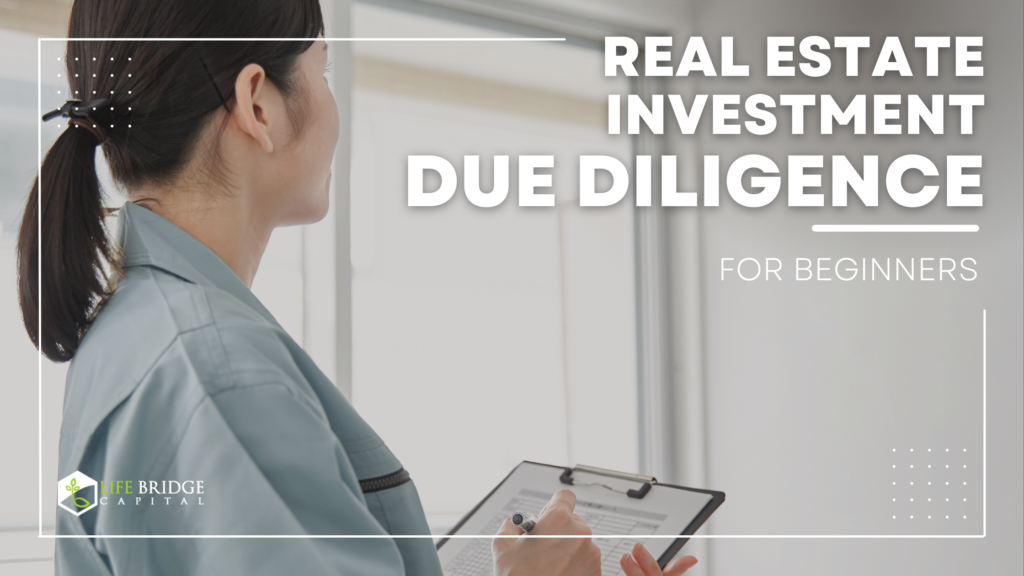
When real estate buyers submit an offer or letter of intent to purchase an investment property, they quickly jump into a fast and furious process known as the due diligence period. During that time, buyers and their representatives will conduct a series of checks and analyses to vet a property. Ultimately, the buyer uses this due diligence information to decide whether to close or walk away from their real estate investment.
Life Bridge Capital is a leading real estate syndication company. We offer our investment partners the opportunity to leverage shares of multifamily rental properties into a passive monthly income. Learn More.
Is the Property a Sound Investment
Investment property transactions require a different mindset than buying a home for personal use. Homebuyers are hoping to find out nothing is terribly wrong with a property they fell in love with and can see themselves living out their lives in.
Investment property buyers are looking for a property that will make them money.
The due diligence period is when buyers have the opportunity to closely inspect the finances, physical condition, and legal situation of a property. Then, the buyer must gather the facts needed to decide whether all signs point toward a profitable venture from these reports and findings.
After submitting a letter of intent, the due diligence process should proceed at a fast and furious pace. To prevent delay and perhaps losing out on the property, know which professionals you intend to use and their estimated turnaround times before initiating an offer.
Be Prepared for the Process to Move Quickly
Investors buying their first property will find a few key differences from a personal transaction.
First, the length of the due diligence process can vary depending on the scale of the property, but it generally moves quickly.
Most importantly, the property inspection and appraisal that are routine in personal transactions are just a fraction of the investment property due diligence process.
Due Diligence Begins Before Placing an Offer
Due diligence refers to a specific period in a real estate transaction when both parties are in a holding pattern as the buyer waits for more information. However, genuinely diligent buyers complete some property research and assessment without the deadline of the ongoing transaction by conducting a market condition report.
Property management companies usually create a market condition report. The report details information unique to the sub-market of the subject property, including amenities, the micro-market, occupancy, and more.
The Due Diligence Process Scrutinizes the Property’s Physical Condition
Determining the actual physical condition of an investment property is all about numbers, specifically how much will it cost to repair, renovate, and maintain a property?
Compare the findings of these reports to the assumptions you used when drafting a business plan. For example, buyers often find the condition of a property to be different than expected, and you may need to walk away if you find that it exceeds your budget.
Physical Inspection and Unit Walk
Knowledge is power when buying real estate, and the physical inspection and unit walk are two critical sources of knowledge. The physical inspection is done by a professional inspector, just like in the single-family purchase process.
The buyer or their representative handles the unit walk. During that time, you visit each unit and area of the property to note its condition and needs.
Together, these two reports help you estimate the costs of needed repairs and make plans for upgrades. And, should you find something unexpected, it may help you negotiate a lower price.
Additional Physical Reports
For a complete analysis of a property’s potential, consider adding a few additional reports during the due diligence period.
An environmental site assessment checks the property for toxins and contaminants. Under federal law, the property owner is usually responsible for cleanup, even if they are not the ones who created the damage.
A green report can assess potential energy efficiency improvements and how they may translate to cost savings.
Financial Reports Provide Insight to Current Operations
Often, determining the physical condition of a property is the easy part. However, sorting out the finances to decide whether or not it has the profit potential claimed by the seller may be more nebulous.
First, the financial audit report, which a private consulting company can prepare, attempts to provide clarity regarding the finances of the investment property through profit and loss statements and by analyzing the building’s operating history. Lenders rely on the details of the financial audit report to approve financing of an investment property.
Another critical financial report that comes from the due diligence phase is the lease audit report. The current property management company usually prepares this report, which includes details about the billing system and lease terms.
Conclusion
The due diligence process in real estate can be daunting, especially for beginners, but it provides a wealth of information that experienced investors use to filter promising properties from money pits.
Life Bridge Capital is a leading real estate syndication company. We offer our investment partners the opportunity to leverage shares of multifamily rental properties into a passive monthly income. Learn More.


